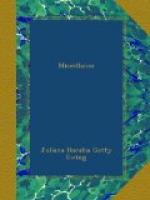“Well, his name is Mackinnon, Cousin; and everybody says he’s always quarrelling; and he complained of our screaming and the cockatoo playing—no, of the cockatoo’s screaming and our playing prisoners’ base, and he kept our ball once, and now he has complained of poor dear Ponto’s going into his garden, and the dear darling old thing has to be tied up, except when we take him out for stiff walks.”
“I didn’t notice anything stiff about his walk yesterday, Fred, He took the fence into your nasty neighbour’s garden at one bound, and came back with another.”
“I don’t know what can make him go there!” cried Fred; “I wish he understood about keeping to his own grounds.”
“Ponto never lived in Constantinople, that is evident,” said Cousin Peregrine.
“Did you ever live in Constantinople, Cousin?” asked Maggie.
“Yes, Maggie, I am happy to say I have.”
“Why are you glad, Cousin?”
“Because in some respects it is the loveliest city on earth, and I am glad to have seen it.”
“Tell us what it is like.”
“And tell us why you say Ponto never lived there.”
“I was a good deal younger than I am now,” said Cousin Peregrine, “when I saw Constantinople for the first time, and had seen much less of the world than I have seen since; but even now I remember nothing in my travels with greater delight than my first sight of that lovely city. It was from the sea. Do you know anything about the Sea of Marmora, Fred?”
“I don’t think I know much,” said Fred doubtfully.
“But we’ve got an atlas,” said Maggie, “so you can show it us, you know.”
“Well, give me the map. Here is the Sea of Marmora, with Turkey-in-Europe on one side of it, and Turkey-in-Asia on the other side of it. This narrower part that you come into it by is called the Dardanelles, that narrower part that you go out of it by is called the Bosphorus. The Bosphorus is about two miles broad; it is salt water, you know, and leads from the Sea of Marmora to the Black Sea, which is farther north. This narrow piece of water going westward out of the Bosphorous is called the Golden Horn. Constantinople—which is built, like Rome, on hills—rises above the shores of the Bosphorus and on both sides of the Golden Horn. The part of it which is south of the Golden Horn is called Stamboul, and is the especially Turkish Quarter. Across the Golden Horn from Stamboul lies the Quarter called Galata—the commercial port—and beyond that Pera—beautiful Pera!—the Quarter where English people live when they live at Constantinople. North of these are more suburbs, and then detached Turkish villages and gay gardens dotting the banks of the Bosphorus.”
“But you lived at Pera?”
“Yes, I lived at Pera; in a house looking into the Turkish cemetery.”
“Was it nice, Cousin, like our churchyard? or do the Turks do horrid things with their dead people, like those Chinese you told us about, who put them in boxes high up in the air?”




